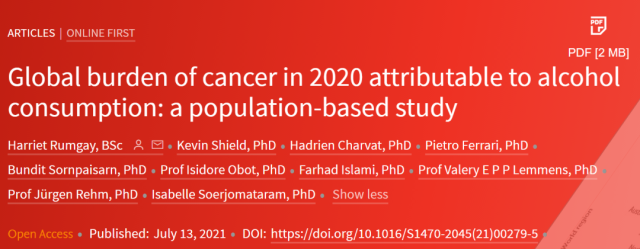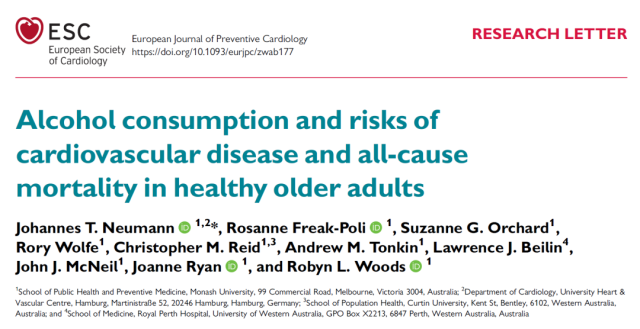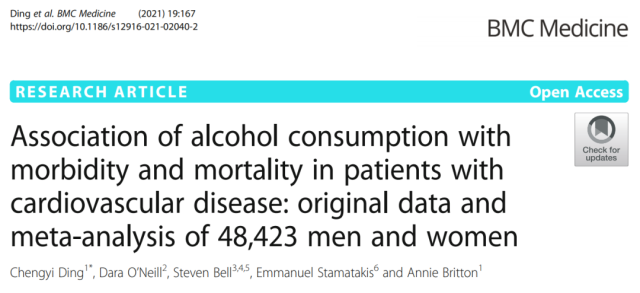People who drink alcohol regularly may have better quality of life?
- OpenAI’s Model Matches Doctors in Assessing Eye Conditions
- UK: A Smoke-Free Generation by Banning Sales to Those Born After 2009
- Deadly Mutation: A New Monkeypox Variant Emerges in the DRC
- EPA Announces First-Ever Regulation for “Forever Chemicals” in Drinking Water
- Kochi University pioneers outpatient bladder cancer treatment using semiconductor lasers
- ASPEN 2024: Nutritional Therapy Strategies for Cancer and Critically Ill Patients
People who drink alcohol regularly may have better quality of life?
- Red Yeast Rice Scare Grips Japan: Over 114 Hospitalized and 5 Deaths
- Long COVID Brain Fog: Blood-Brain Barrier Damage and Persistent Inflammation
- FDA has mandated a top-level black box warning for all marketed CAR-T therapies
- Can people with high blood pressure eat peanuts?
- What is the difference between dopamine and dobutamine?
- How long can the patient live after heart stent surgery?
New research shows that people who drink alcohol regularly may have better quality of life, due to happiness and stress reduction.
Reminder : This article only reports the latest research progress truthfully, and does not encourage drinking.
It is well known that drinking alcohol is harmful to health , many studies have shown that alcohol is a carcinogen, and drinking alcohol is associated with a range of injuries and diseases, including cancer.
But in life, we often hear a saying that drinking in moderation and drinking in moderation is good for health.
However, in August 2018, the leading international medical journal The Lancet published a large study of the burden of alcohol use in 195 countries and territories around the world. and a major risk factor for premature death, with nearly one in 10 deaths globally due to alcohol consumption.
The study concluded that the least harmful amount of alcohol consumed is not drinking at all .

In July 2021, The Lancet Oncology published a large study led by the World Health Organization’s International Agency for Research on Cancer (IARC) .
The study pointed out that more than 740,000 people will have cancer due to alcohol consumption in 2020, and even a small amount of alcohol consumption can significantly increase the incidence of cancer.

The large-scale studies mentioned above all point out that even moderate alcohol consumption is harmful to health .
However, a new study has found otherwise.
At the current European Congress of Anaesthesia, Vera Guttenthaler and Dr Maria Wittmann from the University of Bonn, Germany , report the results of a new study that found that older adults who drank regularly compared to their peers who abstained or consumed very low levels of alcohol.
People (aged 60 and older) had better quality of life in some areas, which the research team believes may be because higher alcohol consumption led to more positive emotions, enhanced social skills, and reduced stress.
In the study, the research team surveyed 628 elderly people aged 60 and older who underwent elective surgery at Bonn University Hospital between 2018-2019 to investigate the association between their preoperative alcohol consumption and postoperative quality of life .
The patients first reported their drinking habits, including the frequency of drinking, the amount of alcohol consumed per session, and whether there was heavy drinking using the Alcohol Use Disorder Recognition Test.
They also reported symptoms of mobility, self-care, activities of daily living, pain/discomfort, and anxiety/depression before and 180 days after surgery.
The research team also adjusted for a range of factors, including age, physical condition classification, education level and body mass index (BMI) .
Based on their alcohol consumption, the research team divided the patients into two groups— no or light alcohol consumption (LAC) , and moderate to potentially hazardous alcohol consumption (HAC) .
Overall, 186 of these patients (30%) had moderate to potentially dangerous unhealthy alcohol consumption, 138 of whom were men and 48 of whom were women.
The mean body mass index (BMI) was higher in the non-drinking or light drinking group than in the moderate to potentially dangerous drinking group (28Kg/m2 vs 27Kg/m2) , especially in female patients ( 29Kg/m2 vs 25Kg/m2 ) .
In addition, the moderate to potentially dangerous drinking group generally had higher levels of education.
For quality of life before surgery, overall, patients in the moderate-to-potentially hazardous drinking group had better overall health, less pain/discomfort, greater self-care skills, and better ability to perform daily activities.
But men in the moderate-to-potentially hazardous drinking group did not differ much in preoperative quality of life from men in the no-or light-drinking group.
For quality of life after surgery, overall, the patients in the moderate-to-potentially hazardous drinking group had significantly better mobility, self-care skills, and activities of daily living than patients in the no-or light-drinking group , and their overall health was significantly better.
The research team said this was an observational finding that assessed only patients undergoing surgery in one German hospital, so it is only possible to conclude that there is a correlation between alcohol consumption and quality of life, but it is still an exciting one. Research topics worthy of further exploration.
In fact, there are also some studies that also found that moderate drinking may have some health benefits. In November 2021, a research team from Monash University in Australia published in the European Journal of Preventive Cardiology entitled: Alcohol consumption and risks of cardiovascular disease and Large-scale research paper on all-cause mortality in healthy older adults .
The large-scale study of about 18,000 people looked at the effects of alcohol consumption on heart health and found that moderate alcohol consumption was associated with a lower risk of cardiovascular disease and lower mortality from all causes compared with never drinking.

In July 2021, a study published in BMC Medicine by University College London Chengyi Ding et al also pointed out that drinking no more than 105 grams of alcohol per week may be associated with a lower risk of death in patients with heart attack, stroke, angina pectoris or cardiovascular disease. related.

Special reminder : This article only reports the latest research progress truthfully, and does not encourage drinking.
(source:internet, reference only)
Disclaimer of medicaltrend.org
Important Note: The information provided is for informational purposes only and should not be considered as medical advice.



